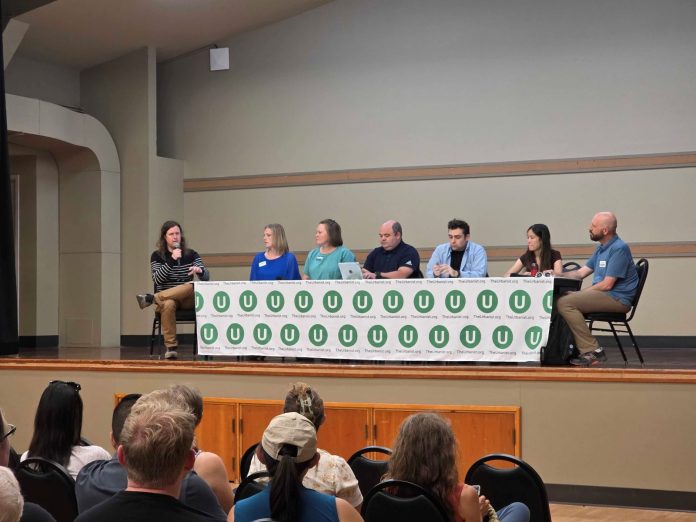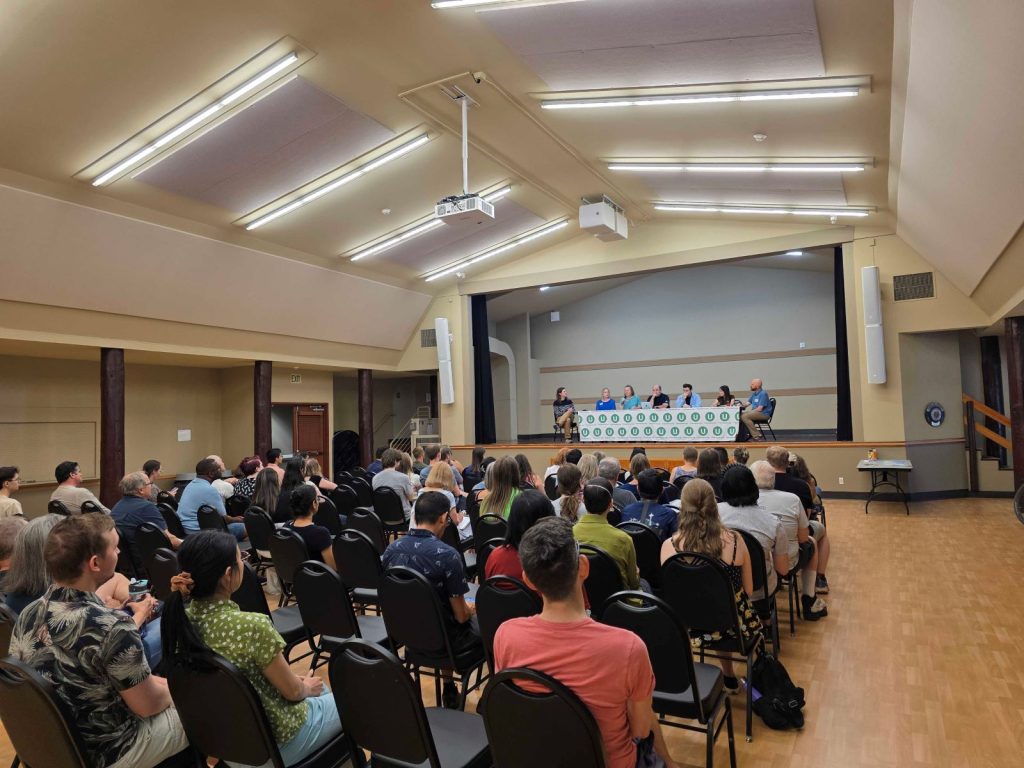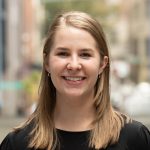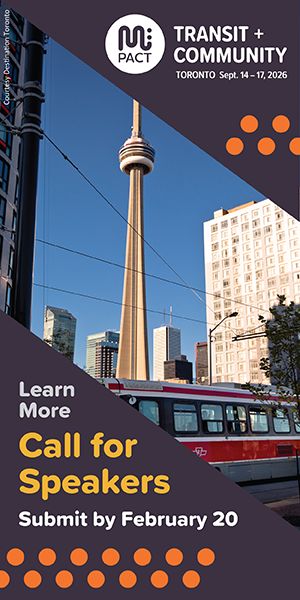
On July 6, urbanists from across the region gathered in Bellevue for the “Urbanism on the Eastside” panel focused on transportation, housing, and growth. Bothell Mayor Mason Thompson, Councilmembers Kelly Jiang of Issaquah, Paul Charbonneau of Newcastle, Melissa Stuart of Redmond, and Michelle Evans of Woodinville, and Council candidate Kurt Dresner of Kirkland discussed their motivations, successes, and future plans as they seek to advance pro-housing, pro-transportation, and pro-accessibility policies and programs in their cities.
The leaders celebrated housing coming online in their cities. Woodinville opened its first affordable housing units at Eastrail Flats in May, Evans said. Stuart noted Redmond’s plans to make Overlake Village its most dense urban center.
With the Eastside increasingly embracing growth, urbanization, and rapid transit, The Urbanist has declared 2025 “the year of the Eastside.”

Bothell didn’t just upzone, but also sent a density minimum of 50 units per acre in its urban core. Bothell City Council also voted last week to remove parking mandates, making it the first city in King County to eliminate such mandates. Mayor Thompson emphasized that the stage was set for that change five to six years ago by “exceptionally talented” people on the Council who have worked since then to make this happen.
Kirkland legalized a variety of middle housing options back in 2020, setting the stage for the newest statewide “missing middle housing” zoning legislation.
Woodinville, Issaquah, and Redmond are carefully considering how they will connect to the rapid transit network, either directly or via bus and local trails. Redmond and Bellevue are already benefitting from the initial Eastside-only 2 Line, but the light rail line will soon cross the lake and connect to Seattle and loop north to Lynnwood in spring 2026.
Following a series of delays, Sound Transit’s bus rapid transit network will start operating in 2028, connecting the I-405 and SR-522 corridors in Kenmore, Bothell, Kirkland, Bellevue, and Renton.
Light rail is set to come to Issaquah in the 2040s, as the final line funded in the Sound Transit 3 package. Jiang highlighted that Issaquah is still building on the foundation set by its 2011 “Central Issaquah Plan” and that they are finally, this year, expecting 155 affordable, transit-accessible housing units to be built.
Such changes, however, have also sparked fierce opposition across the Eastside. Dresner, who was initially inspired to run for city council after seeing vocal opposition to proposed density changes in his neighborhood, highlighted recent tension in Kirkland.
”The question is, are we going to give into this fear of change,” Dresner said. ”Or are we going to recognize that it’s a working, living, breathing city, that needs to work… that needs to be alive.”
💙 Grateful to have joined this amazing panel last night for @theurbanist.org's "Urbanism on the Eastside". Loved the chance to talk housing, transit, and a more connected community with neighbors who care. 👏 Let’s keep the momentum going! 👏
— Kurt For Kirkland (@kurtforkirkland.com) July 7, 2025 at 5:04 PM
[image or embed]
Charnonneau and Evans agreed that tension between urbanists and anti-change councilmembers remains high in smaller jurisdictions with limited budgets like Newcastle and Woodinville — and that they’ve had to be persistent, and sometimes creative, to outmaneuver opposition. Charbonneau described outlasting and outworking the opposition through the lens of his experience as a wrestling coach.
“Something that my dad would say to me after I would get frustrated after council meetings,” Charbonneau said. “He would laugh and say ‘I’m not worried about it…You work harder than they do and you’re younger than they are, you can outlast them.’”
All of the panelists emphasized how important each and every conversation with a constituent is; and that pro-urbanism messaging can connect with anyone if you understand where they’re coming from. For Thompson, that means talking about wanting his kids to be able to live in the same neighborhood they grew up in, close to their families.
Dresner said that highlighting the infrastructure improvements, especially those that curb pollution, that come with redevelopment has successfully turned disagreements into excitement for change. For Jiang, Stuart, and Evans, opportunities for land conservation, trail connections, and park improvements that come with thoughtful density planning often land well with their constituents.
Charbonneau started to build more support by changing who was in the room during council meetings. He pushed Newcastle to move their public meetings from the golf club to the more accessible middle school. They started providing childcare during meeting times, and, with barriers to participation reduced, saw an increase in meeting participants who supported urbanist policies.
And, if nothing else, all of the representatives shared in their faith that, in the long-run, density, and accessible transportation options will win.
“The thing about unsustainable things is that they cannot be sustained. So much of what we’re trying to do is make things more sustainable,” Dresner said. ”And I take some solace knowing that we will have to get there eventually. The question is how much can we make it better, and how much can we get done sooner…how can we make the transition easier?”
Thompson highlighted the straightforward answers that urbanist policies offer.
“We are the only ones who have honest real answers to their problems,” Thompson said. “Even people who disagree on the solution, will agree on the problem. We all hate traffic, and traffic is just people driving cars, so let’s talk about real ways to get less traffic. There’s no magic future where more people are driving cars — and there’s less traffic.”
All of the panelists encouraged attendees to participate in their cities, reflecting on the experiences that drove them to run in the first place. Councilmember Jiang started working with Issaquah through their planning commission and encouraged other urbanists to join commissions in their cities. Councilmembers Charbonneau and Stuart both started their careers knocking on doors for other campaigns. “Hopefully we convey to you today that we’re just regular people too — there’s really nothing special about us,” Evans said.
Each panelist reiterated their hope for the future, and emphasized the importance of involvement, both in running as an urbanist candidate and beyond — including joining councils and commissions, asking for meetings with city staff, writing letters, phone or text banking, knocking on doors, and providing specific opportunities for youth like community advisory groups and junior councils.
“It’s so much easier than you think it is to affect things. Show up, speak up, you will be heard,” said Dresner, who started his advocacy by simply setting up a meeting with a City staff member.
If you are interested in getting involved but don’t know where to start, The Urbanist is hosting a pair of training sessions covering the basics of volunteering on political campaigns, one on August 14th on the Eastside and one on August 21st in Seattle.

Hannah Wheeler
Hannah Wheeler is a writer and marketing professional. She is passionate about advocating for accessible, sustainable cities and public lands through effective communications. She graduated from the University of Washington with aMaster of Communications in Communities and Networks in 2021 and lives in Seattle’s Roosevelt neighborhood.

